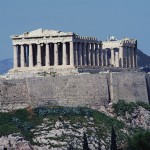 It’s a small world and God is sovereign over it.
It’s a small world and God is sovereign over it.
It’s around 52 A.D. and the Apostle Paul is in Athens waiting for Silas and Timothy.
But instead of holing up in his hotel room and watching pay per view, Paul heads to the local synagogue, and then to the marketplace, to talk about Jesus.
While in the marketplace he runs into some Stoic philosophers. (Acts 17:16-34).
Athens was the heart of Stoicism. In fact, the most famous school of the Stoics, where people came to be trained in the Stoic philosophy, was in Athens near the marketplace. So, it’s likely Paul heard the best arguments the Stoics could muster in Athens.
Probably the most famous Stoic, certainly of that era, was Seneca. He’s also one of my favorite writers. I’ve blogged about him here because he lived during the first century and made some interesting observations about Christians. But more relevant to the story at hand is that Seneca, being the most famous Stoic in the world, was rewarded with the job of personal tutor to the most powerful man in the world, Nero Caesar. Nero was Caesar from 54 A.D. to 68 A.D.
After leaving Athens, Paul journeys to Corinth, where the local Jews accost him and drag him before the region’s governor, Gallio. Gallio was Seneca’s brother. Gallio releases Paul, refusing to punish him for what he sees as a purely religious squabble among the Jews. (Acts 18:1-17).
Approximately ten years after his encounter with the Stoics at Athens and Seneca’s brother in Corinth, Paul would preach the gospel to Nero. We know this because in Acts 27:23-24, an angel tells Paul in the midst of the storm and imminent shipwreck that he will survive the shipwreck because he must stand before Caesar.
Now, we don’t know what happened when Paul made his defense to Nero, but I do believe in the sovereignty of God. I’m wondering if God arranged Paul’s encounter in the capital of Stoicism ten years prior to begin preparing Paul for the Stoic questions that would be presented to him by the Seneca-trained Nero, or perhaps Seneca himself.
I’m wondering whether Paul’s meeting with Gallio was more than a coincidence and permitted him to do some name-dropping with Nero or Seneca: “I’ve met your brother, Gallio, a wise man, and when allegations were made against me regarding the gospel I preach, he dismissed the charges.”
I don’t know, I’m just guessing. What we do know is that Nero apparently released Paul from imprisonment and from there it’s believed Paul preached the gospel in Spain, ultimately returning to Rome where he was martyred.
What we do know is that God is sovereign. GS
